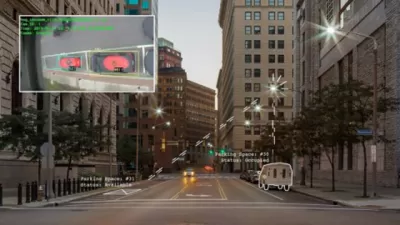Planners have debated for decades that surveillance cameras don't deter crime, more "eyes on the street" do. A recent study shows that the cameras are worth their expense, in some cases.
Results were best in Baltimore and Chicago, but not as much in Washington, D.C.
From the Urban Institute press release, authors of the study:
"Between 2007 and 2010, researchers from the Urban Institute's Justice Policy Center studied public surveillance systems in Baltimore, Chicago, and Washington, D.C., to measure the extent of their use, their effects on crime, their other benefits, and their costs.
While results varied by area, surveillance systems in Baltimore and Chicago produced more than enough benefits to justify their costs. No cost-benefit analysis was conducted in Washington, D.C., because the cameras didn't show a statistically significant impact on crime there.
Much of the cameras' success or failure depended on how they were set up and monitored, and how each city balanced privacy with security, said Nancy La Vigne, the study's lead researcher and the director of the Institute's Justice Policy Center.
"Overall, the most effective surveillance systems are those that are monitored by trained staff and have enough cameras to detect crimes in progress and investigate them after the fact," La Vigne observed."
FULL STORY: Surveillance Cameras Cost-Effective Tools for Cutting Crime, 3-Year Study Concludes

Alabama: Trump Terminates Settlements for Black Communities Harmed By Raw Sewage
Trump deemed the landmark civil rights agreement “illegal DEI and environmental justice policy.”

Planetizen Federal Action Tracker
A weekly monitor of how Trump’s orders and actions are impacting planners and planning in America.

How Atlanta Built 7,000 Housing Units in 3 Years
The city’s comprehensive, neighborhood-focused housing strategy focuses on identifying properties and land that can be repurposed for housing and encouraging development in underserved neighborhoods.

In Both Crashes and Crime, Public Transportation is Far Safer than Driving
Contrary to popular assumptions, public transportation has far lower crash and crime rates than automobile travel. For safer communities, improve and encourage transit travel.

Report: Zoning Reforms Should Complement Nashville’s Ambitious Transit Plan
Without reform, restrictive zoning codes will limit the impact of the city’s planned transit expansion and could exclude some of the residents who depend on transit the most.

Judge Orders Release of Frozen IRA, IIJA Funding
The decision is a victory for environmental groups who charged that freezing funds for critical infrastructure and disaster response programs caused “real and irreparable harm” to communities.
Urban Design for Planners 1: Software Tools
This six-course series explores essential urban design concepts using open source software and equips planners with the tools they need to participate fully in the urban design process.
Planning for Universal Design
Learn the tools for implementing Universal Design in planning regulations.
Caltrans
Smith Gee Studio
Institute for Housing and Urban Development Studies (IHS)
City of Grandview
Harvard GSD Executive Education
Toledo-Lucas County Plan Commissions
Salt Lake City
NYU Wagner Graduate School of Public Service




























